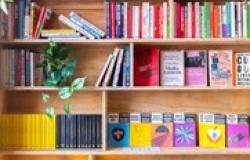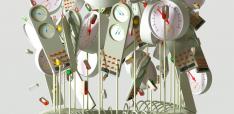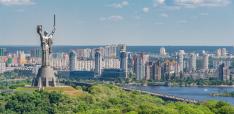Reading Rooms as Spaces of Decolonial Education for Young People

This is the fifth chapter in a forthcoming e-book, entitled 'Decolonial Education and Youth Aspirations'. Amira Hayat and Lizzy Willmington explore a project committed to developing spaces and actions for social change rooted in community.
The Cardiff Reading Room is a youth-led project which develops skills and spaces of critical thinking to tackle and engage with real world issues which impact our lives and opportunities. It developed from our own frustrations with how mainstream educational approaches and community opportunities did not equip young people with these skills.
This chapter will discuss the pilot Cardiff Reading Room project which ran across 2022/23 (1). During this year we facilitated four themed public events at The Sustainable Studios, each theme was explored through a Pluto Press book. The authors who joined were David Randall to discuss Sound System (2017), Amelia Horgan to discuss Lost in Work (2021), Leah Cowan to discuss Border Nation (2021) and Arathi Sriprakash to discuss Learning Whiteness (2022). Our Reading Room is an iteration emerging through a radical model of experimental arts-led learning tested and developed by scholar activists Stephanie Bolt and Eric Lesdema. We enjoy a close relationship with Pluto Press, Left Book Club and SHED that developed over a series of conversations and grew through Left Book Club traditions (Pluto Press; Samuels 1966)(2).
Within the context of this project we understand and practice decolonial through the way we challenge traditional academic and educational structures. We are a youth-led project which practises a decentralised process through how we organise. We practise a fluid, reflective and bottom up approach, choosing to forgo more familiar top down and rigid modes of organising and learning. By bringing communities together from different walks of life across Cardiff, we aim to break down community silos to learn from each other's embodied experiences rather than depersonalised second hand knowledge. We believe lived experience is a much more effective way to learn about each other's cultures, traditions and religions. The Cardiff Reading Room challenges the traditional structure of learning by putting lived experience as the forefront of the sessions rather than putting ‘expert’ theories and ideas at the forefront. Decolonial practices are embedded throughout the project, from our aims and purposes, to who is involved and how we organise. This will be developed in the themes below.
This content of this chapter was co-produced in conversation by the above authors. Three questions were posed by Amira and Lizzy to frame the discussion, who identified and developed themes from the discussion into the chapter. The questions posed were, how do you think the Reading Room embodies practices of decolonial education?; how has (and does) this project facilitate your needs and aspirations as a young person; and how has the project evaluation process been useful? The chapter takes the following themes in turn: critical thinking, dialogue, self-governance and challenging hierarchy. Rather than distinct, the themes run through all aspects of the project, reinforcing the project's approach to challenging notions of boundaries and hierarchy.
Critical thinking
Creating opportunities to develop and embed critical thinking is a core purpose of the project. Thinking about our collective future requires thinking differently if we want a different future to the one seemingly on offer. By critical thinking we mean critically engaging in traditional understandings and power structures of contemporary issues as well as challenging our own thoughts and opinions and changing our perspective of the world as we know it. The Cardiff Reading Room encourages independent thinking, through self-governance and expression. How the events are run, in the facilitation and participation, invites people to try something new and consider issues from different perspectives. Through different topics and books, the events not only supported a critical understanding of mainstream systems of education, work, immigration and culture, but also how we can challenge and change current systems and what better systems might look like. This questioning was supported through prompts in the books, but also how it relates to issues impacting people in the room.
In our experience, traditional classroom structures lack acknowledgement of diverse cultural histories. They therefore lack the knowledge other cultures, traditions, practices and people bring. We selected books which provide an opportunity to generate discussion and learning and would address some of these gaps in mainstream understandings. Lived experience is an effective way to learn about the world around us, through conversation, storytelling and building real human relationships. Generating a space for people to share their own knowledge, the Cardiff Reading Room challenged traditional narratives and a diversity of perspectives brought a more complex approach to social issues. The project invited curiosity in people who came to the events, to find out what it was about, what they could possibly learn, who they could meet. This is what we wanted to encourage through an engaging and immersive way of learning.
The practice of questioning and critical thinking was central to decision making, especially in regard to the choice of books, questioning ourselves on why we choose to discuss a certain book, why we covered certain topics, their relevance to the community and space we held, as well as questioning our own perspectives and opinions. When choosing the books from the Pluto Press catalogue for the Cardiff Reading Room, it was crucial to think about relevant issues that are impacting society, but also our communities in South Cardiff specifically. We then identified people who could facilitate these themed events who could also develop their skills in this opportunity of a new proposed way of facilitating. We proposed holding a space to learn, to be curious and connect while simultaneously encouraging discussion, disagreement and questioning even the shared narrative emerging through the event (Sudarsan and Hayat 2023). Reflecting on the pilot project, encouraging diverging and differing opinions is something we plan to cultivate more in the future of the project.
Dialogue
Dialogue is central to every aspect of the Cardiff Reading Room project, from collectively choosing and reading books to facilitating events. The reading process of the book was a fusion of reflective and collective approaches. Sometimes we shared voice notes as we read the book, other times we read the book individually and came together to discuss it. We reflected on themes, our thoughts and reactions to them both intellectually and personally, and how these could shape discussion in the sessions. This process created a shared dialogue and developed understanding; dissecting and discussing themes and ideas together as a group in supportive and productive space. This developed a practice of dissecting and developing ideas together, as well as creating a practice and experience for articulating and sharing ideas. Doing this before the events built confidence to share ideas at the public events, both as facilitators and participants. Embedding this approach from the beginning supported dialogue and collaboration as the foundation of the project, giving confidence for this approach of the event facilitation.
The public events were facilitated in two parts, the first half was a conversation between the facilitator and the author, the second half was group discussions with current policy prompts to connect the themes and Cardiff and Wales. For example, the event on culture and music was given local context through the Cardiff Music City plan (Cardiff Council 2019). The basis for discussion at the event on immigration were two Welsh policies; the Nation of Sanctuary (Welsh Government 2019) and Anti-Racism Action Plan for Wales (Welsh Government 2022). The conversation in the first half of the event around Border Nation shaped the discussion, which were in turn grounded through local issues and critical consideration for potential change through these policies. It also meant that people could engage with the group discussions without having read the book prior to the event through the conversation in the first half. These group discussions were informal, leading to a more fluid and lively discussion. Everyone was engaged, most people spoke and were able to build their confidence in speaking about these topics.
Emphasising grounded dialogue values experience and engagement over a traditional individual learning through reading. Our work takes this approach. Through the conversational interview style, the facilitators and authors weaved through their own lived experience during the book discussion. This grounded and personalised systematic and structural issues and gave contemporary issues historical understandings. It allows others to relate or identify through their own personal experiences, rather than abstract theories or policies, and de-centres the ‘expert’. An important part of this was through the encouragement of everyday language, rather than academic language. This language acts as a barrier to understanding the topic and isolating people, rather than bringing people into the conversation. This was fundamental to the ethos of the project; we wanted the events to be for the community, by the community.
The events were open and public, therefore different and divergent opinions were expressed and discussed. Through each other's lived experience and understanding of the world, it was a space to meet, talk, discuss, disagree and learn. There was a thinking across the community. These discussions related to how the topics affected people in the city. Specifically, how people who are predominantly from backgrounds that are impacted by class, employment, race, religion, and education, are affected. It supports the idea that we, communities who are impacted by these issues, are organising our own space to challenge rigid systems.
Self-governance
The project supported creating opportunities to develop skills, confidence and gain experience. This both shaped and was shaped by the project. As with critical thinking, spaces to develop expression, advocacy and governance of self was missing from our experience in formal state education. Our experience of school education did not train us to be critical independent thinkers and change makers. The Cardiff Reading Room actively enables and encourages this; we are able to take part in and lead projects that we are interested in and passionate about. We are led by interest and enthusiasm and supported to develop our skills. Responding to our experiences in authoritative structures, the project is collective and non-hierarchical, decisions are made through discussion, as discussed above.
Often writing is about people rather than by young people from diverse, poorer and disenfranchised backgrounds. We have all been invited to speak at events to be “the diverse voice”. The Cardiff Reading Room takes co-production seriously. Through this project, we were able to develop the agenda, to shape the conversation with the author, and to contribute to the project development and solution focus. Our definition of co-production comes from the collective and in-depth creative practice that is embedded within our communities. Rather than a publisher event to promote the author as an owner of ideas, we organised our own space to engage in discussion about these issues through ideas. Rather than theories and concepts, issues introduced in the books were understood, shaped and grounded through our own experiences.
The public event facilitation gave us the opportunity to lead and hold spaces that are simultaneously ‘safe’ and ‘brave’. This was a daunting and new experience, but through supportive collective preparation, planning and decision making, we developed confidence and self-assurance. In turn, the experience developed this confidence and self-assurance. It has affirmed us in our power; we each have our own power to participate and hold space to make change. For example, for those of us who had aspirations of teaching, it has opened up ideas and approaches of how to engage in educational spaces in ways that challenge traditional ideas and structures, towards a more collaborative and discursive approach.
Challenging hierarchy
A key principle of decolonial strategies is understanding and challenging power dynamics within systems and structures of power. The project sets out to challenge these explicitly through the choices of books we focus on and implicitly through how we work and organise. The non-hierarchical aspiration of dialogue set a shared commitment to ensuring a mutual respect and value to contributions made, both in the organising of the events as well as discussion during them. The author and facilitator joined the group discussions, shifting the usual Q&A style public events into a workshop on a more equal footing. The events felt like everyone was part of them, participants rather than listeners, which was confirmed from feedback we received.
By challenging traditional roles of ‘learner’ and ‘expert’, it enabled space for raising questions and encouraging expression. This non-hierarchical structure welcomes different ideas and ways of learning, making the learning aspect more accessible and welcoming to all types of learners. The Cardiff Reading Room, on the other hand, encourages and holds space for challenging theories and ideas, inviting these questions into a wider discussion to provoke thoughts and ideas.
Rather than an outcome, the emphasis is on the process. As we are not part of a formal body or institution, we do not need to comply with external structures or requirements. While people take responsibility for different roles and activities, identifying, developing and assigning roles is through collective decision making and therefore individuals are representatives for the collective production of the project. This chapter, for example, is developed from a group conversation to reflect on the project. This challenges the emphasis on the individual, and celebrates a decentralised, collective and co-produced work.
To support our project planning and evaluation we engaged a tool called REBEL. REBEL stands for Recognition of Experience Based Education and Learning and was co-designed by academics and community activists, headed by Paul Haywood, Dean of Academic Programmes at Central St Martins (Bradfield and Meller 2022). The tool is a series of hand held cards with prompts and learning descriptors to encourage recognition of learning through a peer to peer process (3). Members of the Cardiff Reading Rooms had previously worked with REBEL and brought this experience into the planning and evaluation meetings to encourage us to critically interrogate why we are doing what we are doing and why we did what we did. It helped us forefront and return to the purpose of the project and embedded reflective thinking, while gaining confidence in critical thinking and the project's purpose. This process acknowledges every person’s view, as we go around the group and share our reflections, ensuring each person within the group has space to speak and what they say is valued and integrated into the development of the project.
As REBEL is used as both a planning and evaluation tool throughout the project, it supports the fluid and responsive way we work in a considered and reflective way. It enables planning and evaluation to be more actionable and gives direction to reflection while responding in real time to developing and adapting the project. This continually reflective and fluid process is in contrast to many evaluation processes which bring in an expensive external consultant to evaluate the project, often at the end. It is consistent with our commitment to our peer learning, skills development skills and self-governance. Again, valuing experiential learning, the REBEL tool is not a theoretical activity, but can only be understood by doing it. It has been invaluable not just for this project, but as noted by one of us, it has shifted our entire way of thinking.
Reflections on the Project
The Cardiff Reading Room is a project committed to developing spaces and actions for social change rooted in our community. Rather than despair and hopelessness of the way things are, the project brings people together to work collectively. It encourages solidarity and hopefulness of a different future, as well as skilling and empowering young people in their aspirations to work towards this future. Through this project we have developed our individual goals and aspirations for the future, such as critical thinking, advocacy and governance through our common aspiration of the project's aims. Through this embedded and purposeful approach, we have gained self-confidence and self-governance, as well as experience and skills, to understand our power in how we can not only be part of the change we want to see but to drive it. We are committed to finding ways to think about the world in a completely different way. This pilot project is being developed into a three year project which will take place in Cardiff, the Rhondda Valley and Blaenau Ffestiniog (4). How more people get involved and how do we share the learning or share opportunities to more young people is now the focus of the planning and preparation, such as developing a governance structure and advocacy plan. These developments are new to many of us, but our collective and dialogic approach, with the REBEL tools, are supporting us in this development. It is crucial to the development, growth and sustainability of the project.
The systems we live and work within can and do make us feel isolated, but being involved in the Cardiff Reading Room project has been incredibly motivating. It actively goes against isolation, helping pull us out of individual isolation and towards working and discussing issues important to us together, collectively. It has instilled a motivation and hope to aspire for the future. Key within the project is an aspiration to share our way of working which encourages an opening of perspectives, as we believe that this creates hope and possibility for working towards a better collective future.
We are dedicated to the collective, experiential and discursive approach. While this is lengthy, and this project is not our full time job, we understand the power of a purposeful and collective journey working towards these goals. The project aims are not quickly achievable. It has supported some of those involved to move beyond an interest in social justice to become social impact advocates through a broader understanding and learning of structures of power, such as law and governance. This has helped to understand colonial strategies which are being implemented today and how to undermine them through critical thinking and building the confidence to question certain structures, to think of new ways to operate and to demand change.
Amira Hayat is a poet, activist, writer and aspiring journalist. She works closely with different communities to learn and share stories, spark change and create platforms, breaking boundaries and connecting people through lived experience
Instagram @mirahayat
Tiktok @amira.h
Website - amirahayat.com
Lizzy Willmington researches at the intersections of law and humanities, with a focus on immigration and creative resistance. Her work considers critical and creative methods of grassroots mobilisation to challenge and disrupt racial and migrant injustice. She is a Lecturer in Law at Cardiff University.
Website: https://profiles.cardiff.ac.uk/staff/willmingtones
Linkedin: https://www.linkedin.com/in/lizzy-willmington-4061a8333/
Image: The Sustainable Studios
Notes
- The project was funded by the Cardiff University’s Innovation for All Funding (HEFCW)
- The model developed through experience working with the framework of UAL Awarding Body Foundation Diploma in Art and Design
- These are mapped against the ESCO European Framework and UNESCO cross-cutting competencies.
- The project is hosted by Arts Action Trust and is funded by The Lottery Fund


